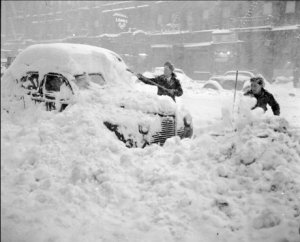As I write this post, I sit holed up in my home, fireplace ablaze and the coffee maker filling the house with the scent of its hazelnut brew. With plenty of leftover delicacies from Christmas dinner, my family and I were prepared to remain sequestered as the first blizzard of the winter approached. Frankly, I was gratefully looking forward to the snow, and my gratitude was increased because it had held off until Sunday morning worship service was completed. It is this point, which is the crux of this post.
Pastors up and down the east coast of the United States were frantically or worriedly watching weather reports over the past twenty-four hours, wondering if they would need to cancel Sunday morning services on the day after Christmas. Many faced the promised storm with bravado, feigned or otherwise, proclaiming that nothing could or would prevent them from holding service on Sunday morning. I listened to some, and read the responses of others, as many publicly professed what they were going to do. As I observed, only periodically adding my opinion, I remembered where I used once stood philosophically.
When we began Harvest Christian Fellowship, nearly four years ago, I was full of the zeal and bravado that I heard and read from many of my contemporaries in pastoral ministry. There wasn’t a thing that would prevent me from opening the doors of the church on Sunday morning. It couldn’t rain, snow, sleet, or hail enough to dissuade me from leading that merry band of saints in worship, praise, and adoration of our Lord. There was a “word” from the Lord, and neither “devil” nor force of nature would prevent me from getting it to the saints. The additional, hinted to, and sometimes painfully obvious companion reason was a financial one; Sunday was our chief, nearly sole, giving opportunity. If Sunday service was canceled, how would the church survive. I am able to be transparent and admit that this was going through my mind. I am able to also pull back the veil and say that I believe much of the bravado and “by any means necessary” pastoral declarations have much to do with this as well.
Last winter put my philosophy to the test. There was over a foot of snow in December 2009, another major storm in January 2010, and then finally the blizzard of February 2010. In December 2010, I waited until the last possible moment to cancel Sunday service, and worried that church finances would suffer. They didn’t; men and women brought their tithes and offering to the church during the week, or the next week. When January weather threatened to force cancellation I again waited to make the decision, although with less angst. The outcome was the same. By the time the blizzard arrived in February, my philosophy had changed, and the decision was simple. What changed? I, through the message of the gospel, gained an even clearer picture of what it means to be a pastoral leader.
A shepherd lays down his life for the flock that he is charged to keep. Our model for this is Christ. To his detriment, he thought of us first. So it should be in pastoral ministry. I began to reflect on the influence that we, as servants of Christ, are given in the lives of those we serve. There are, I came to understand more clearly, people who will “go” simply because the pastoral leadership has said that it is the right thing to do. That means that there are a number of families, however small the number, that would clean off their cars and attempt to make their way to church just because the pastor said the doors would open. I was confronted with answering this question to myself…what would I do if even one of those families were injured on the way to or from church because our “proof” that we were zealous for God was to venture out in bad weather? I would feel horrible, and rightly so. Jesus came to deliver us; he arrived to lead us away from harm. His Spirit came to continue to do the same, as he sanctifies us and keeps us holy. By extension, pastoral leadership is called to have the best interest of the people in mind.
God is not impressed that we keep our church buildings open in snowstorms or blizzards. He doesn’t care that a few hardy souls put on snowshoes or drove snow mobiles and made it to church. The fruit that glorifies God are transformed and holy lives, and these are lived throughout the year. I would encourage pastoral leaders to reevaluate why we do what we do, as it pertains to bad weather closings or ministry offerings. Bragging rights as the bravest or most committed to preaching in bad weather aren’t impressive credentials in the end. Did you put the wholeness and welfare of God’s people above yourself? An affirmative answer to that question is far more impressive. By the way, the blizzard that was threatening to cancel service yesterday morning has been downgraded to four to six inches. The time sequestered with family was still priceless.
